


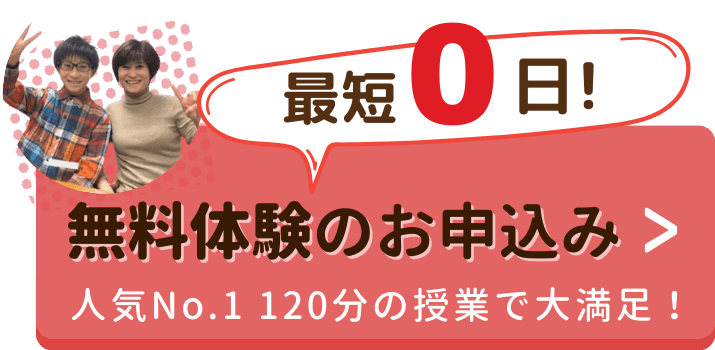
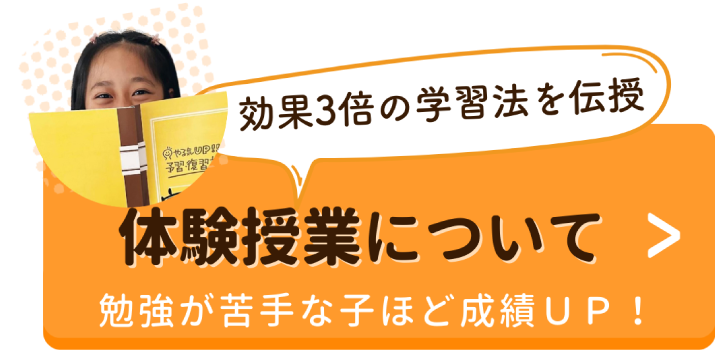
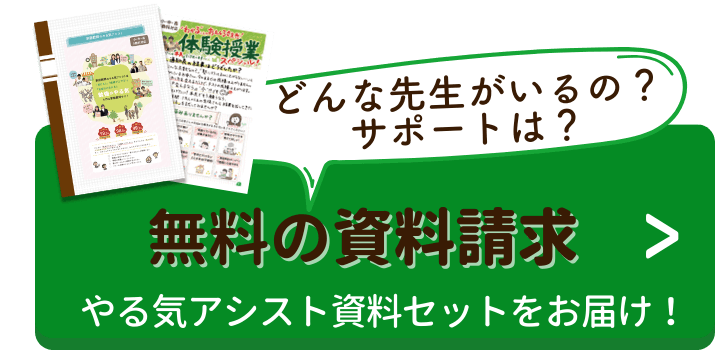

神奈川県の2023年3月実施の令和5年度(2023年度)入学者の公立高校入試問題の解説をしています。
受験勉強において、過去問を解くことはとても効果的な勉強法です。ぜひ、受験までに一度挑戦し、問題の傾向を掴んでおきましょう。合わせて、対策などをたてられるととても良いですね。
また、過去問で苦手な点が見つかった場合は、そこを中心に試験日当日までにしっかりと対策しておきましょう。
【放送内容】
問題(ア)は、No.1~No.3まであります。JudyとKenが話をしています。まずJudyが話し、次にKenが話し、その後も交互に話します。対話の最後でKenが話す言葉のかわりにチャイムが鳴ります。そのチャイムのところに入るKenの言葉として最も適するものを、問題(ア)の指示にしたがって答えなさい。対話は2回ずつ放送します。
Judy:What did you do during summer vacation, Ken?
Ken:I visited my friend, Tom, in Australia. He stayed at my house last year. It was good to see him again.
Judy:That’s nice! Did you go there with anyone?
Ken:(チャイム)
1. Yes, he went there alone.
2. Yes, I went there with my family,
3. No, my sister and I went there.
4. No, he stayed in Australia.
Judy:Ken, I watched your soccer game yesterday. You are a very good soccer player.
Ken:Thank you! I practice very hard because I want to win every game.
Judy:I see. How long do you usually practice in a day?
Ken:(チャイム)
Judy:Ken, our school trip to Kyoto last week was fun! What did your group do there?
Ken:My group visited a museum and a temple, and my group also had lunch at a nice restaurant.
Judy:That’s good! Which was your favorite place?
Ken:(チャイム)
1. I was excited when I visited Kyoto with my friends.
2. I’m going to visit a museum with my group members.
3. I liked the temple the best because it had a beautiful garden.
4. My favorite restaurant was not in Kyoto.
【放送内容】
問題(イ)は、No.1とNo.2があります。それぞれ同じ高校に通うMikeとAkikoの対話を放送します。対話の内容を聞いて、それぞれの質問の答えとして最も適するものを、問題(イ)の指示に従って答えなさい。対話は2回ずつ放送します。
Mike:Akiko, I want to learn how to make some Japanese food.
Akiko:My family loves cooking. Would like to come to my house and cook with us this Sunday?
Mike:Yes. That sounds great! What time should I come to your house?
Akiko:Well, we usually eat dinner at 6:00. We want to start cooking two hours before dinner. Can you come then?
Mike:Yes, I can.
Akiko:I hope you’ll enjoy dinner with us.
質問:What can we say about Mike?
Mike:Do you play the guitar, Akiko?
Akiko:Yes. I began to play the guitar when I was five years old.
Mike:Really? You began playing the guitar when you were so young! Why did you start?
Akiko:My mother took me to a guitar concert, and I loved it. After the concert, my mother bought me a guitar, and I started playing it.
Mike:That’s great! I wish I could play the guitar. Can you teach me?
Akiko:Yes, I can. Let’s begin today!
質問:What can we say about Akiko?
【放送内容】
問題 (ウ)に入ります。 高校生のケイタが英語の授業でスピーチを行います。 スピーチを聞いて, 問題 (ウ)の指示にししたがって答えなさい。 英文は2回放送します。
Hi, I’m Keita. I’m going to talk about the things that happened last weekend. I like playing tennis, and I usually practice tennis at school on weekends if it’s not rainy. However, last weekend, it was rainy, and I couldn’t play tennis. So, on Saturday, I read books at home. And on Sunday, I cooked lunch for my family, and they loved it. It was the food I ate in Okinawa during the school trip. At first, I was sad that I couldn’t play tennis, but now I realize I like reading and cooking. The rainy days gave me a chance to do things I didn’t usually do. So, my friends, if things you don’t like happen, you don’t need to be sad. It will be a chance for you to find something new. Thank you.
【ワークシート】
Keita’s Speech
〇Keita usually 【①】 on weekends if it’s not rainy.
〇Last Saturday, he 【②】.
〇Last Sunday, his family 【③】.
Question: What is Keita’s message to the students in the class?
【④】
【①】~【③】の中に入れるものの組み合わせとして最も適するものを、あとの1~9の中から1つ選び、その番号を答えなさい。
【①】
A:reads books
B:plays tennis
C:does new things
【②】
A:cooked lunch for his family
B:practiced tennis at school
C:read books at home
【③】
A:ate the lunch he cooked
B:went to a restaurant in Okinawa
C:played tennis together
【④】の中に入れるものとして最も適するものを、次の1~4の中から一つ選び、その番号を答えなさい。
1. You should practice harder than other people if you want to be a good tennis player.
2. You should try something different when you can’t do the things you want to do.
3. You should stay home and read books when it’s rainy on weekends.
4. You should cook lunch for your family when it’s rainy on weekends.
2 誰かと一緒にオーストラリアに行ったのかと尋ねられている。
4 ふつう1日にどれくらい練習するのか尋ねられている。
3 気に入った場所はどこかと尋ねられている。
3 アキコの2回目の発言と、マイクの応答に注目。
1 マイクとアキコの1回目の発言に注目。
5 スピーチ前半よりケイタについて「雨天でなければ、週末にテニスをする」「先週土曜日は、家で本を読んだ」「先週日曜日は、家族は彼が作った昼食を食べた」ということが分かる。
2 スピーチ後半のmy friendsという呼びかけ以降が、ケイタのメッセージになっている。
次の(ア)~ (ウ)の文の( )の中に入れるのに最も適するものを、あとの1~4の中からそれぞれ一つずつ選び、 その番号を答えなさい。
(ア)I can’t carry the table because it’s very ( ). Will you help me?
1. bright 2. deep to 3. heavy 4. glad
(イ)I hope the ( ) will be sunny tomorrow because I’m going to go fishing.
1. company 2. festival 3.health 4. weather
(ウ)Let me ( ) my friend. His name is Taro. He is from Kamome Junior High School. He likes playing basketball.
1. communicate 2. improve 3. introduce 4.respect
(ア) 3
1.輝いている 2.深い 3.重い 4.嬉しい
一人で運べないので、助けてほしいと言っているので、3が正解
(イ) 4
1.会社 2.祭 3.健康 4.天気
明日晴れたら魚釣りに行くと言っているので、4が正解
(ウ) 3
1.会話する 2.改良する 3.紹介する 4.尊敬する
その後にタロウを紹介しているので、3が正解。
次の(ア)~(エ)の文のの中に入れるのに最も適するものを、あとの1~4の中からそれぞれ一つずつ選び、その番号を答えなさい。
A: Tom, you speak Japanese well.
B: I ( ) in Japan with my family for three years when I was a child.
1.lived 2.have lived 3.live 4.lives
A: Which would you like to drink, apple juice or orange juice?
B:Well, it’s difficult for me to choose because I like ( ) apple juice and orange juice.
1.between 2.about 3.both 4.than
A: I want to be a doctor and help many people. How about you?
B: I haven’t decided ( ) I want to do in the future.
1.whose 2.what 3.when 4.why
A: Why do you like your English class?
B: Because I can learn a lot of things by ( ) with my friends in English.
1.to talk 2.have talked 3.talked 4.talking
接続詞で結ばれる分の時制(過去形とか現在形とか)は合わせないといけない。whenの後が過去形なので、過去形の1を選べばよい。
「both A and B」で「AもBも両方」という意味になる。両方好きなので選ぶのが難しいという文にすればよい。
関節疑問文の形をとり、「将来何をしたいか決められない」とすればよい。
前置詞の後は動名詞を取る。汎用性が効くので覚えておくとよい。
次の(ア)~(エ)の対話が完成するように、( )内の六つの語の中から五つを選んで正しい順番に並べたとき、 その( )内で3番目と5番目にくる語の番号をそれぞれ答えなさい。(それぞれ一つずつ不要な語があるので、その語は使用しないこと。)
A: We’re going to watch a soccer game this Sunday. Is (1. to 2. anything 3. I 4.there 5. should 6. bring )?
B: You’ll need something to drink because it will be hot.
A : Please tell (1. will 2. goes 3. you 4. come 5. me 6. when ) back home.
B: Sure. I’ll be at home at 7:00 p.m.
A: Eri, (1. have 2. we 3. milk 4.are 5. any 6.do) left in the bottle?
B: No, I drank it all.
A : Don’t (1. afraid 2. asking 3. be 4. to 5. questions 6. of) if you have something you don’t understand.
B: Thank you.
「何か持っていくべきもの」とすればよい。
4-2-3-5-6
「いつあなたが戻ってくるか教えて」とすればよい。
5-6-3-1-4
「ミルクが残っているか」という文を作ればよい。やや難。
6-2-1-5-3
「質問することを恐れないで」という文にすればよい。askが原形ならばtoを持ってくる。
3-1-6-2-5
次のA~Cのひとつづきの絵と英文は, ケイコ (Keiko)がオーストラリアを訪れていたときのある日のできごとを順番に表しています。 A の場面を表す 〈最初の英文〉に続けて、Bの場面にふさわしい内容となるように、【】の中に適する英語を書きなさい。 ただし,あとの〈条件〉にしたがうこと。
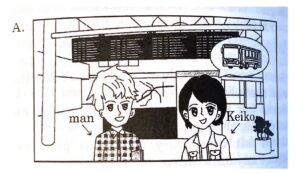
〈最初の英文〉
One day, Keiko tried to go to ABC Park alone. At the station, she asked a man, “Where is the bus terminal?” The man answered, “It’s by the west exit of the station.”
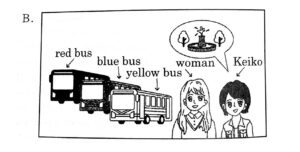
When she got to the bus terminal, there were three buses, a red one, a blue one, and a yellow one. Keiko asked a woman there, “I want to go to ABC Park. 【】 the park?”
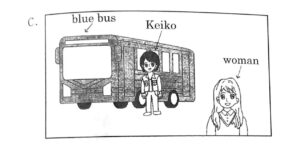
“Yes, I do. The blue one. The fifth stop from here is ABC Park. Have a nice day,” the woman answered. “Thank you very much,” Keiko said.
〈条件〉
① bus, goes とknowを必ず用いること。
② ①に示した語を含んで、【】内を7語以上で書くこと。
③ the park? につながる1文となるように書くこと。
※短縮形 (I’m やdon’tなど) は1語と数え, 符号(, など)は語数に含めません。
(例)Do tou know which bus goes to
次の英文は, 高校生のカイト (Kaito) が英語の授業で行った人工知能についての発表の原稿です。 英文を読んで、あとの(ア)~(ウ)の問いに答えなさい。
Hi, I’m Kaito. Today, I will talk about AI *devices. We use many kinds of AI devices like *robots, *drones, and *smartphones. Al devices collect a lot of information, remember it, and use it to do work given by humans. I think AI devices can make our lives better. There is still a lot of work AI devices cannot do, but they can do some work to make our lives easier. Through my speech, I want you to learn more about AI devices and to imagine how we can live with them in the future.
I didn’t know anything about AI devices before I joined an event about them this summer. It *was held by Kamome City. At the event, I learned about many kinds of AI devices. I saw a robot that worked like a doctor. When a woman told the robot that she had some problems with her body, it asked her some questions, and gave her *suggestions to make her feel better. A man from Kamome *City Office said to me, “Though this robot can work like a doctor, (①). It cannot *replace a doctor. But there will be more robots working in hospitals in the future.” At the event, I started thinking about ways to make AI devices that can help humans.
After I went to the event, I started to learn more about AI devices. I’ve learned that AI devices are used in many different ways. For example, AI
devices help farmers. Look at this *graph. It shows the changes in the number of farmers in 2010, 2015, and 2020 in Japan and how old they were in each year. The number of farmers became smaller, and the *percentage of the farmers who were 60 years old and older than 60 years old became larger. And now, AI devices *are expected to be a great help to farmers.
I went to another event to learn how AI devices actually help farmers. One robot I saw there helped farmers pick tomatoes. The robot has a *camera on it to collect a lot of information about the tomatoes. It remembers the shapes and *colors of *ripe tomatoes and decides when to pick the tomatoes. When it decides to pick the tomatoes, it picks them with its arms. Farmers send the tomatoes that the robot has picked to the tores. At this event, I talked with a farmer who used the *tomato-picking robot. I asked him, “What do you think about working with the robot?” He said, “I don’t think robots and humans can do all of the same work. But (②) Today, robots have become very important. The number of young people who want to be farmers has become smaller, because a farmer’s work is hard and needs much experience. If robots can do the hard work for farmers, they will improve farmers’ lives. I hope more young people will want to become farmers.”
AI devices are used in our lives in many ways. I’ve learned that it is difficult for us to live without AI devices in today’s world. However, we need to
remember AI devices are not perfect. Al devices can remember all the information they collect, but (③). So, we always have to think about
effective ways of using them. I hope that more AI devices will be used to help people. AI devices, like the doctor robot and the tomato-picking robot, can improve our lives. So, I want to make AI devices that can work well with humans to make our lives better in the future. That’s my dream. Thank you for listening.
本文中の下線部が表す内容として最も適するものを、次の1~4の中から一つ選び、その番号を答えなさい。
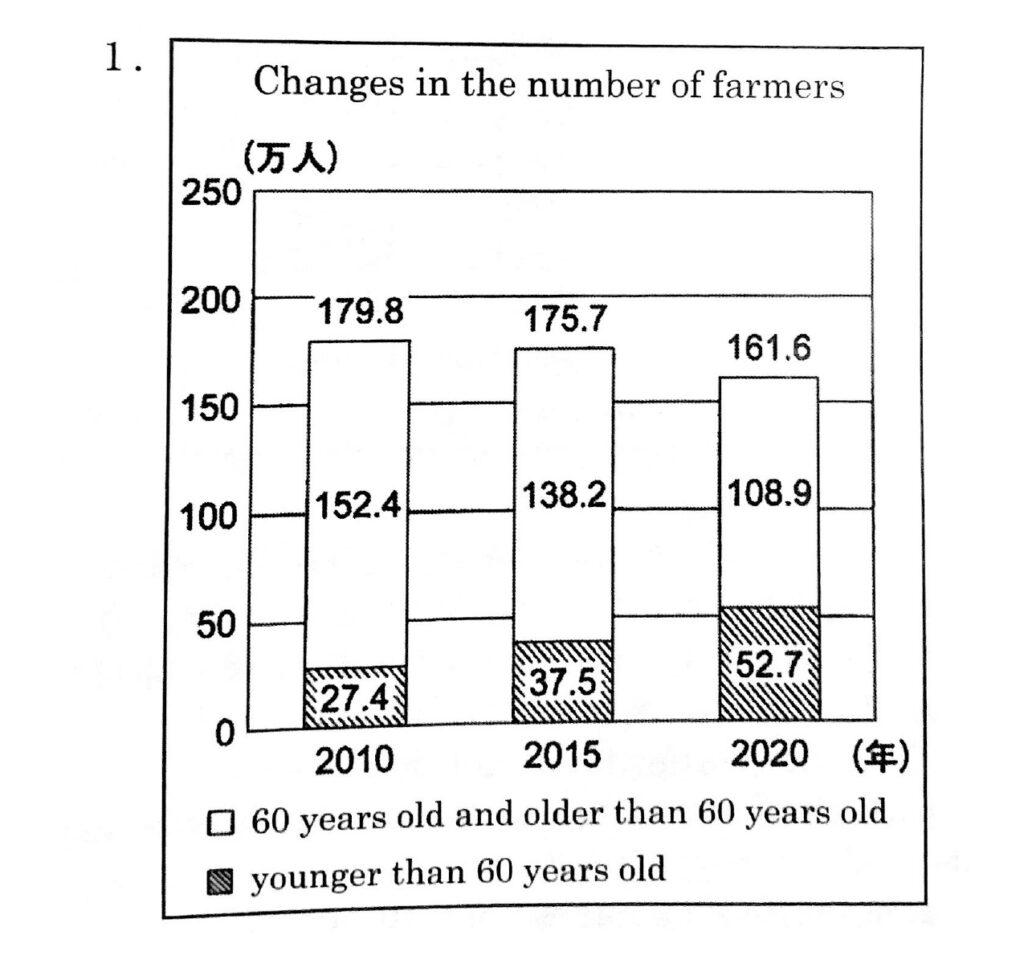
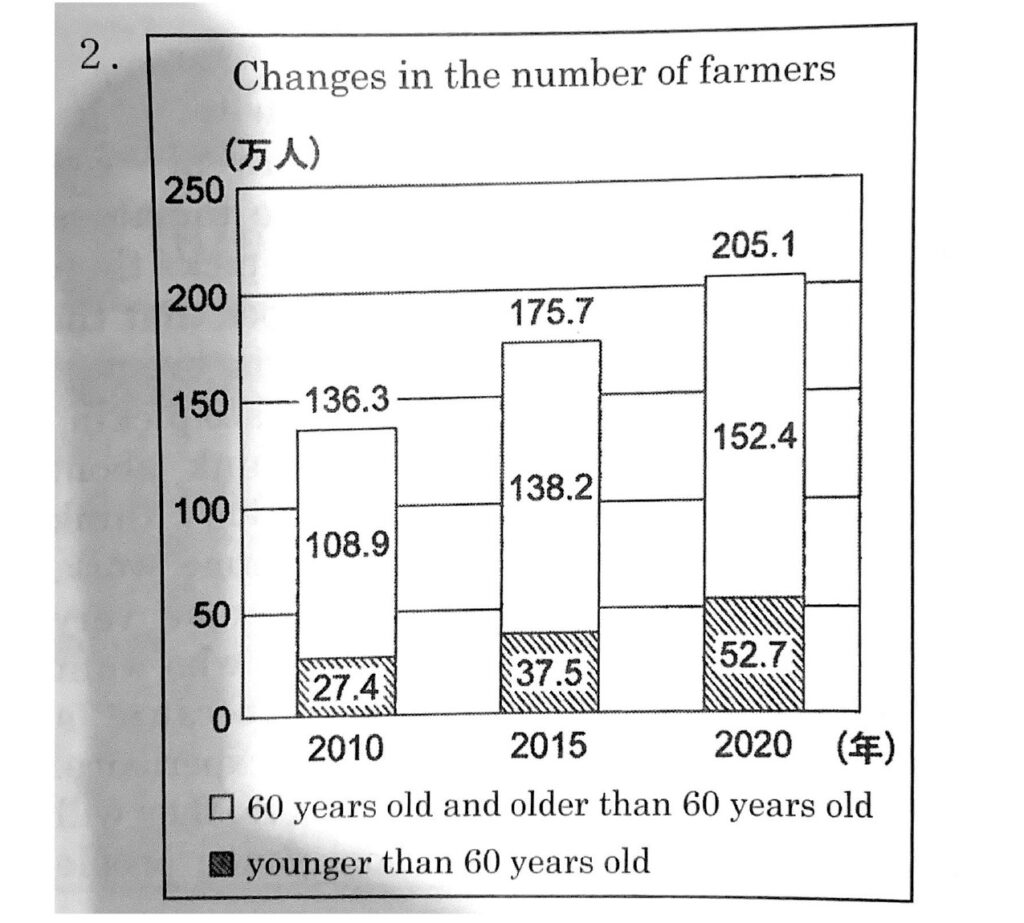
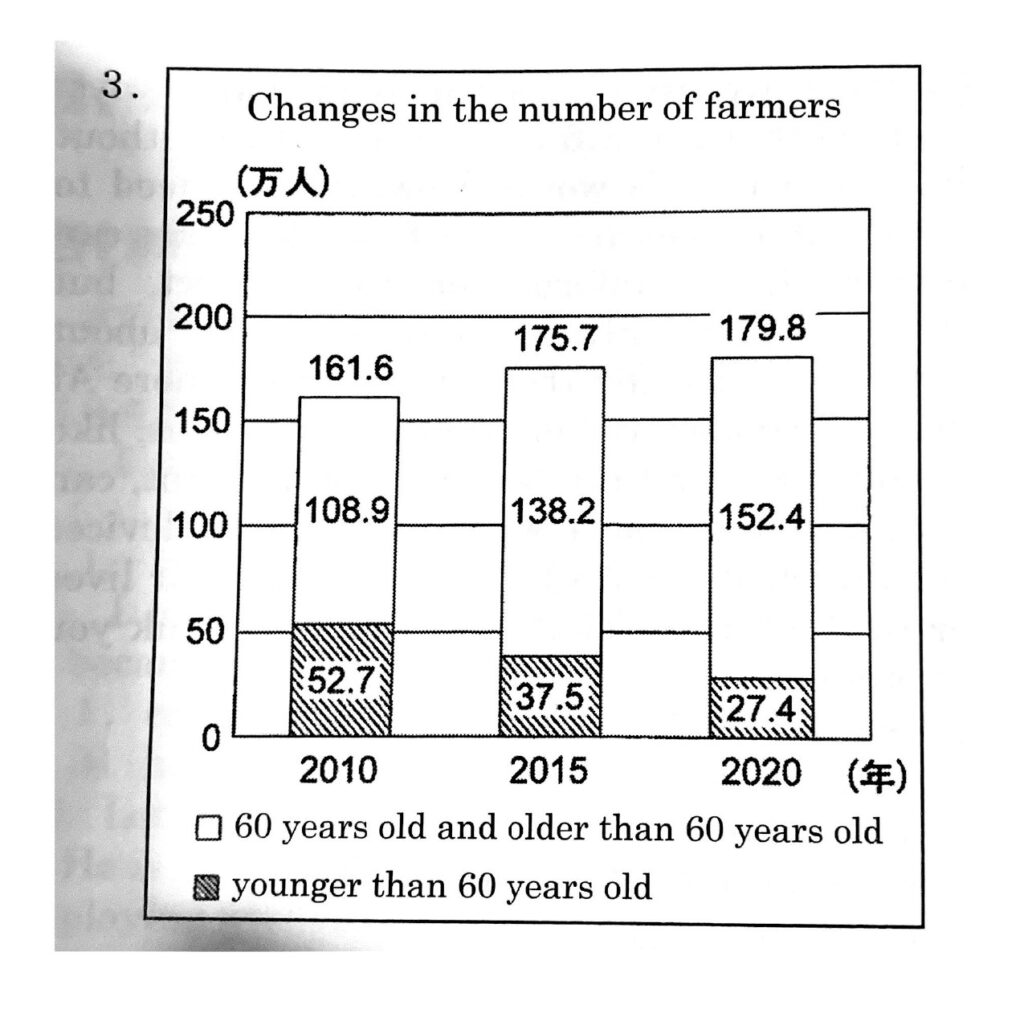
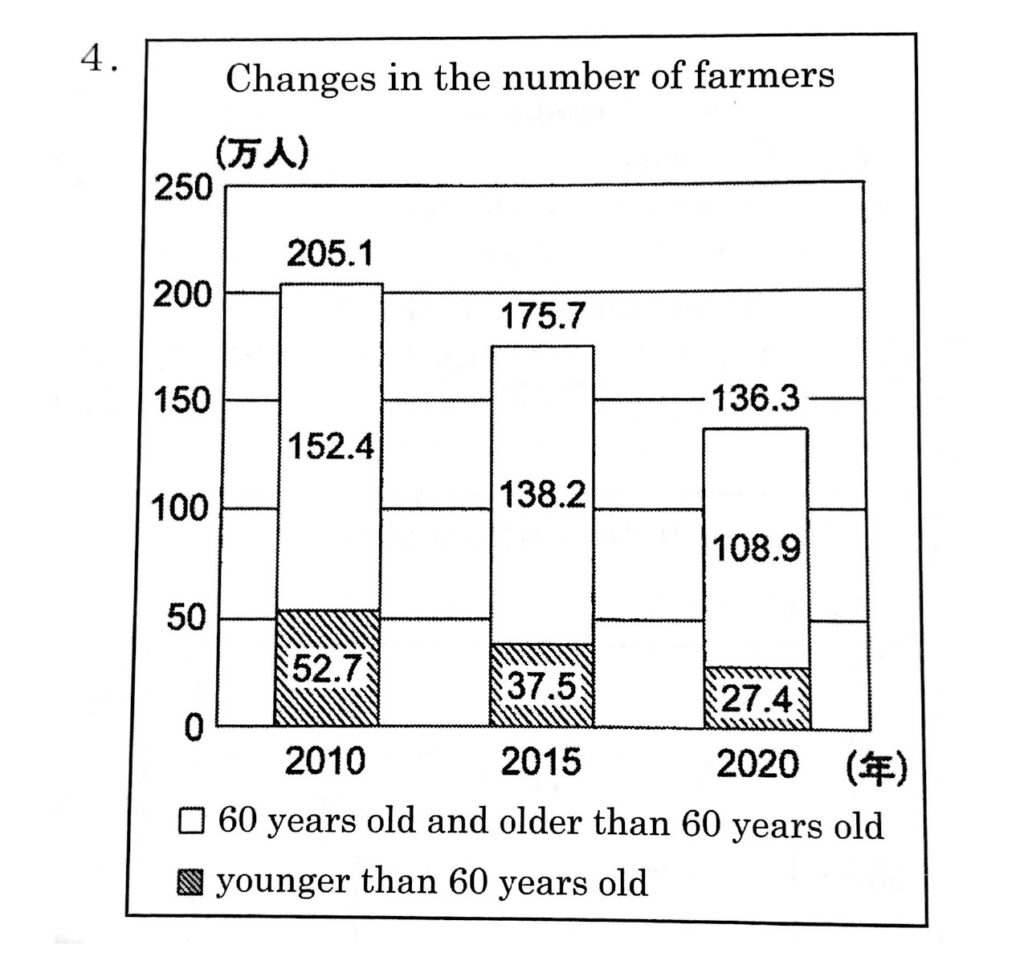
本文中の(①)~(③)の中に,次のA~Cを意味が通るように入れるとき, その組み合わせとして最も適するものを,あとの1~6の中から一つ選び, その番号を答えなさい。
A. there are things it cannot do
B. humans have to teach the devices how to use it
C. robots can do some work humans do
1. ①-A ②-B ③-C
2. ①-A ②-C ③-B
3. ①-B ②-A ③-A
4. ①-B ②-C ③-A
5. ①-C ②-A ③-B
6. ①-C ②-B ③-A
次のa~f の中から、本文の内容に合うものを二つ選んだときの組み合わせとして最も適するものを、 あとの1~8の中から一つ選び, その番号を答えなさい。
a. Kaito wants his audience to imagine a future with AI devices in his speech.
b. Kaito found at the event he joined that the doctor robot couldn’t give a woman suggestions.
c. Kaito learned at the event he joined that Japanese farmers didn’t like using AI devices.
d. The tomato-picking robot does a lot of work such as sending tomatoes to the stores.
e. Robots will improve farmers’ lives by doing the hard work that farmers do.
f. Kaito’s dream is to make AI devices that can replace humans.
農家の人数は減っているから1,4に絞られ、60歳以上が増えているから、1が正解と分かる。
空所前後の内容や接続詞を根拠に、つながりの良いものを選べばよい。
aは第一段落の最終文、eは第四段落の最後から2文目を参照すればよい。
次の(ア)の英文とリスト (List), (イ)の英文とポスター(Poster)やリストについて,それぞれあとの質問の答えとして最も適するものを, 1~5の中からそれぞれ一つずつ選び、その番号を答えなさい。
Becky is a high school student in Australia. She is going to stay at Miki’s house in Kamome City. Miki and Becky are sending messages to each other on their *smartphones.
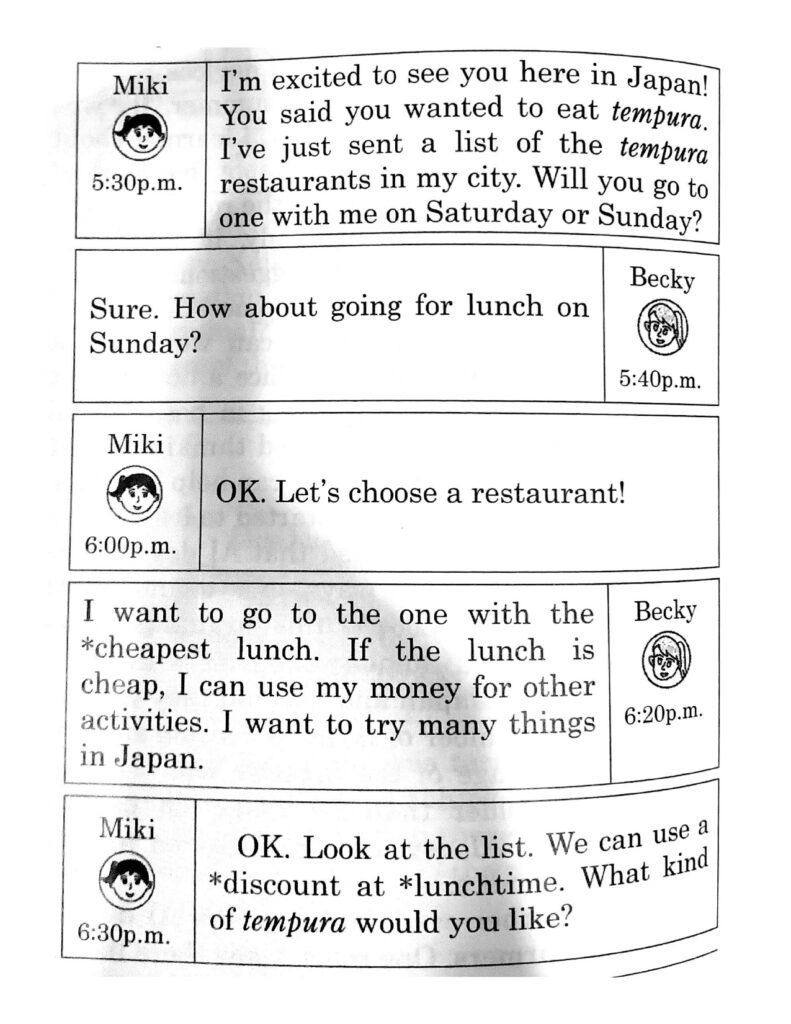
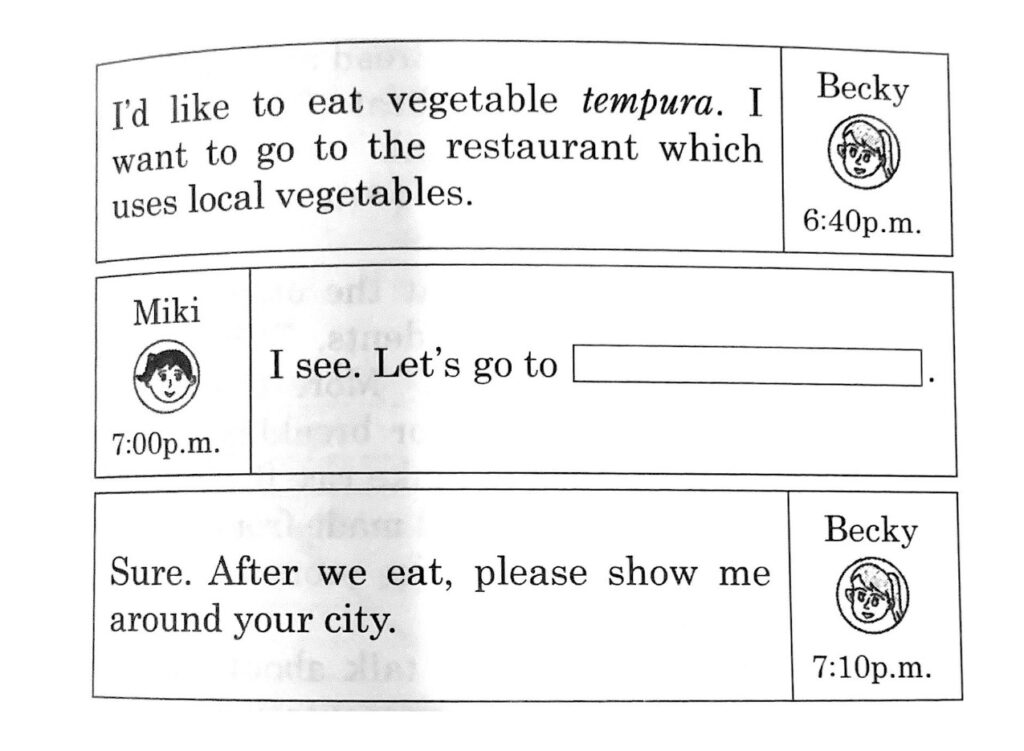
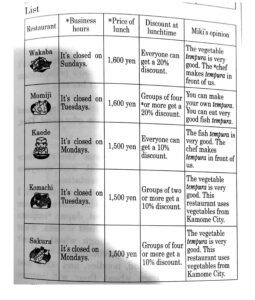
質問:What will be in 【 】?
1.Wakaba 2.Momiji 3.Kaede 4.Komachi 5.Sakura
Daisuke is a high school student. He is talking with Mr.Green at school.
Mr. Green:Hi, Daisuke. What are you doing?
Daisuke:I’m looking at this poster. I’m going to join this speech *contest.
Mr. Green:That’s great! You have one week before the *deadline. Have you sent the things to take part in the first *round?
Daisuke:No, I haven’t. I have just got an *application form and I have decided the topic of my speech.
Mr. Green:Oh, what is the topic of your speech?
Daisuke:I will talk about Japanese culture. I have already found some interesting books about it and I have read them. I’ll write a *summary of my speech next.
Mr. Green:Well, I think you should write your *script first. When your script is finished, you can write the summary quickly.
Daisuke:OK. I’ll do that. After that, I will practice how to *gesture during my speech. I think gesturing well is important in an English speech.
Mr. Green:I think that is important, too. But speaking well is more important. So, you should practice speaking English before the voice *recording. You should practice gesturing after sending the voice recording for the second round.
Daisuke:Thank you. I’ll make a list of the things to do for the speech contest now.
Mr. Green:That’s good! Good luck!
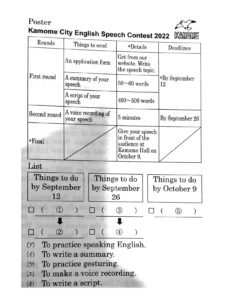
質問:What will be in (①), (②),(③),(④),and(⑤)on the list?
1. ①-イ ②-オ ③-ア ④-エ ⑤-ウ
2. ①-イ ②-オ ③-ウ ④-エ ⑤-ア
3. ①-オ ②-イ ③-ア ④-ウ ⑤-エ
4. ①-オ ②-イ ③-ア ④-エ ⑤-ウ
5. ①-オ ②-イ ③-ウ ④-エ ⑤-ア
「日曜日に営業していること」「割引を含めて、最も安く昼食を食べられること」「地元の野菜天ぷらを食べられること」に合致するものを選べばよい。
「あなたは最初に原稿を書くべきだ。原稿を書き終えれば、概要を速く書ける」「音声録音の前に、英語を話す練習をするべきだ。2回戦用の音声録音を送った後で、ジェスチャーの練習をするべきだ」を参照すればよい。
次の英文を読んで、後の(ア)~(ウ)の問いに答えなさい。
Ayumi and Masao are Kamome High School students. One day in Jane, they are talking in their classroom after school. Then, Ms.White, their English teacher, talks to them.
Ms.White:Hi, Ayumi and Masao. What are you doing?
Ayumi:We are talking about the school festival in September. Masao and I are in the cooking club, and our club is going to do something about the future of Japanese rice.
Ms.White:Rice? That’s interesting. Why are you so interested in rice?
Masao:Because we think we should eat more rice. My grandfather *grows rice in Tohoku and sends his delicious rice to my family every year. He is always happy when my family says we enjoy eating his rice, but he worries about the future of Japanese rice.
Ms.White:Oh, why does he worry about it?
Masao:He said, “The rice *consumption in Japan has been *decreasing a lot because of *changes in our *eating habits.”
Ms.White:Oh, really?
Masao:Yes. After I heard that, I used the Internet and found ①this *graph. It shows the amount of rice one person ate in a year in Japan from 1962 to 2020. In 1962, one person ate 118.3kg of rice. In 2000, one person ate about 55% of the amount in 1962, and, in 2020, one person ate a smaller amount of rice than in 2000.
Ayumi:After Masao showed me this graph, I became interested, too. So we decided to do something about the future of Japanese rice at the school festival. We wanted everyone to become more interested in Japanese rice.
Ms.White:Then, what are your ideas?
Masao:I joined a *volunteer activity to grow rice last month. The activity began in May and will finish in August. I’ve been learning how to grow rice. At the school festival, I want to make a presentation about Japanese rice by using the graph and the pictures I took during my volunteer activity.
Ms.White:That’s great!
Ayumi:Ms. White, look at ②these two graphs. To know what the students in my school like to eat, I asked 40 students, “Which do you like the best, bread, noodles, or rice?” Bread is the most popular among them, and more than 80% of them like bread or noodles better than rice. Bread and noodles are *made from *wheat flour. Then, I started to think about making something by using *rice flour *instead of wheat flour.
Masao:Ms. White, look at the other graph. I asked the 40 students, “What do you eat for breakfast?” More than 50% of them eat bread for breakfast. So, our club decided to make rice flour bread. I think eating bread made from rice flour will increase rice consumption in Japan.
Ayumi:So, our club will talk about Japanese rice in Masao’s presentation and sell rice flour bread at the school festival. We hope everyone will be more interested in Japanese rice and like our rice flour bread.
Ms.White: I think that is a very good idea. I can’t wait to listen to Masao’s presentation and eat your rice flour bread!
One day in September, after the school festival, Ayumi and Masao are talking in the classroom after school. Then, Ms. White talks to them.
Ms.White:Hi, Ayumi and Masao. The rice flour bread was wonderful, and everyone enjoyed Masao’s presentation.
Masao:Thank you. After the school festival, I used the Internet and learned more about rice and *wheat. Japan *imports about 90% of the wheat it uses. What will happen if enough wheat doesn’t come from foreign countries?
Ms.White: I think bread, noodles, and other food made from wheat flour will become very expensive.
Ayumi:But I don’t think Japanese people can 【】 because their eating habits have changed a lot, and many Japanese people eat food made from wheat flour.
Ms.White:You may be right. How about rice?
Masao:Oh, we grow enough rice in Japan, and we should eat more rice. Let’s find ways to increase our rice consumption.
Ayumi:Let’s do that! We can create new *recipes to use rice flour.
Ms.White:When your club members cook next time, please let me know!
Ayumi:Sure.
本文中の下線部①と下線部②が表す内容を、①はア群、②はイ群の中からそれぞれ選んだ時の組み合わせとして最も適するものを、あとの1~9の中から一つ選び、その番号を書きなさい。
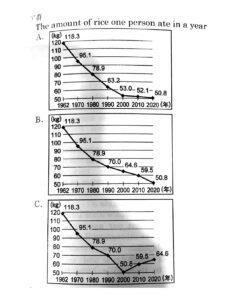
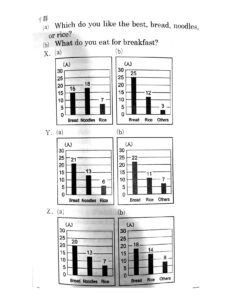
本文中の【】の中に入れるのに最も適するものを次の1~4の中から一つ選び、その番号を答えなさい。
1. stop eating food made from wheat flour
2. continue to eat food made from wheat flour
3. increase their wheat consumption
4. eat more rice and stop using rice flour
次のa~f の中から、本文の内容に合うものを二つ選んだときの組み合わせとして最も適するものを、あとの1~8の中から一つ選び、その番号を答えなさい。
a. Masao’s grandfather always sends his rice to Kamome High School for the school festival.
b. Masao thinks that changes in people’s eating habits have increased rice consumption in Japan.
c. Masao decided to make a presentation about Japanese rice by using his experiences during his volunteer activity.
d. Ayumi made bread by using wheat flour because bread was the students’ favorite food.
e. Masao thinks that eating more rice flour bread is a good way to increase rice consumption in Japan.
f. Ayumi and Masao want to create new recipes that use wheat flour because rice is not popular.
「2000年の1人あたりの米消費量は、1962年の量の約55%だった」を参照。
約118kg×0.55=約65kgとなるので、グラフBが適切。
空所前後の内容をもとに、つながりの良いものを選ぶ。
cはマサオの4回目の発言の最終文より、eはマサオの5回目の発言の最終文を参照。
家庭教師のやる気アシストは、神奈川県にお住まいの受験生のお子さんを毎年たくさん指導をさせ頂き、合格に導いています。
おかげさまで、昨年度の合格率は97.3%という結果を残すことが出来ました。
高い合格率の秘訣は、指導経験豊富な先生の指導力に加え、1対1の指導でお子さん一人ひとりの状況に合わせた、お子さんだけのカリキュラムで勉強が進められるから!
家庭教師のやる気アシストは、お子さんの志望校合格まで全力でサポートさせて頂きます!
お子さんにとって「成果が出る勉強法」ってどんな勉強法だと思いますか?
お子さんそれぞれに、個性や性格、学力の差もあります。そんな十人十色のお子さん全員に合う勉強法ってなかなかないんです。
たからこそ、受験生の今だけでもお子さんだけの勉強法で受験を乗り越えてみませんか?
やる気アシストには、決まったカリキュラムはありません。お子さんの希望や学力、得意や不得意に合わせて、お子さんだけのカリキュラムで指導を行っていきます。また、勉強法もお子さんそれぞれに合う合わないがあります。無料体験授業では、お子さんの性格や生活スタイルを見せていただき、お子さんにとって効率的な成果の出る勉強のやり方をご提案させて頂きます。

